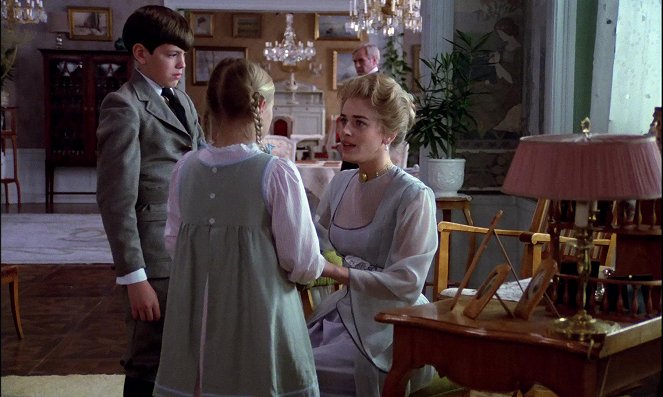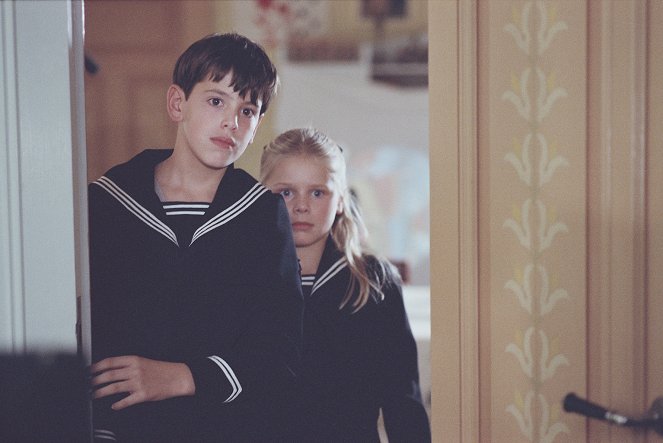Directed by:
Ingmar BergmanScreenplay:
Ingmar BergmanCinematography:
Sven NykvistComposer:
Daniel BellCast:
Pernilla Allwin, Bertil Guve, Börje Ahlstedt, Harriet Andersson, Mats Bergman, Gunnar Björnstrand, Allan Edwall, Stina Ekblad, Ewa Fröling, Erland Josephson (more)VOD (1)
Plots(1)
Through the wide eyes of ten-year-old Alexander (Bertil Guve), we witness the great delights and conflicts of the Ekdahl family a sprawling, convivial bourgeois clan living in turn-of-the-century Sweden. Intended as Ingmar Bergman's swan song, Fanny and Alexander (Fanny och Alexander) is the legendary filmmaker's warmest and most autobiographical film, a triumph that combines his trademark melancholy and emotional rigor with immense joyfulness and sensuality. (official distributor synopsis)
(more)Videos (3)
Reviews (7)
"The little guy is giving kisses like a big man!" It started out pretty good, Gustav Adolf was first only into women, but then... This needs to be watched at least as a series with a longer break because otherwise, it is impossible to tolerate the absence of the soundtrack, which turns the viewing experience literally into misery. Otherwise, of course, it's more palatable to regular Bergman viewers; they find their favorite themes (religion, interpersonal relationships, gender), and familiar faces and can easily reflect on the development of Swedish society over the last century. As a solitary film and a first encounter with Bergman, I don't recommend it (not least because this film was the one that cemented that strange era of art films in cheap book stores).
()
Watching Fanny and Alexander is not like watching an ordinary movie, it's more like reading a novel. It can be a bit demanding to watch it all at once, but returning to it in the right mood brings a delightful experience. Although Bergman's life confession lacks surprising or dramatic moments (and is therefore difficult to focus on), it is a captivating narrative with amazing performances and beautiful dialogues.
()
In the same way that Oscar Eckdahl believes that his little theatre reflects a piece of the big world outside it, this little movie is a reflection of our big world too. Fanny and Alexander is the last of the Master’s film works (just television projects followed) and seriously he quitted when he was out on top. The three-hour version is a picture that lives a life of its own. The atmosphere sucks you in and gives you the feeling that you have been watching for much longer than the movie’s running time. But it’s a time pleasantly spent, avidly following the (ir)regular lives of the Ekdahl clan through Alexander’s innocent perspective. There is nothing to fault in terms of acting and technical considerations, perhaps just Bergman’s theatrical directing. But who cares when it’s so indescribably effective. Some day I would certainly like to see the five-hour cut, because there are a couple of places where it trails off a bit.
()
Unconventional Ingmar Bergman, who shows that he truly mastered the film medium and presents the viewer with a beautiful and painful childhood in Fanny and Alexander. They are adorable, but the world around them is not only beautiful. Childhood can be fun, it can hurt, and this is beautifully visible in this film, moreover, its visuals are simply enjoyable to the eye.
()
An intimately tuned trip to the Swedish bourgeois society of the early 20th century, where Ingmar Bergman projected his childhood memories mixed with his extraordinary imagination into the film. He filmed it as a mature creator who learned from his mistakes and who cared about the acceptance of his work by the wider public. Some of his previous works brought artistic critics to ecstasy, but for viewers, they were on the verge of bearability. The director abandoned the harshly pessimistic view of the world and, although he does not avoid the topic of death and the loss of a loved one here either, optimism prevails, and the final family celebration ends completely idyllically. The story can be considered a confrontation between the thinking and values of the liberal bourgeois upper middle class and Protestant intolerant bigotry. The clash between the bishop and the little Alexander can be seen as a conflict between modernity and remnants of medieval thinking. Love for the theater (Bergman considered himself much more of a theater director than a filmmaker) is inserted into scenes from the family theater environment, which is directly related to the plot, where the little protagonist's mother works as an actress and his father is a theater director. It is no coincidence that Alexander's father dies on stage... The film is dominated by excellent acting performances - thanks to his position, Bergman was able to work with the best Swedish actors, and he also raised a number of actors himself, who knew well what their boss wanted from them. The film has excellent camera work and carefully chosen costumes and sets. In my opinion, this is Bergman's best film. Overall impression 95%. The best scenes are the ones with Alexander's stay in the house of the Jewish merchant, where the exoticism of the environment merges with the child's imagination and creates a surreal atmosphere.
()



Ads